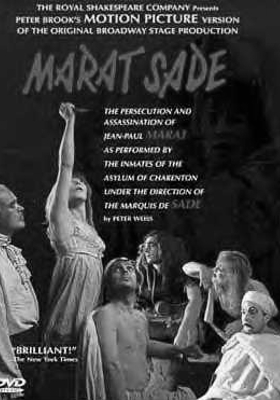The Persecution and Assassination of Jean-Paul Marat as Performed by the Inmates of the Asylum of Charenton Under the Direction of the Marquis de Sade, usually shortened to Marat/Sade, is a 1963 play by Peter Weiss. The work was first published in German.
Sade As Moralist:
Maurice Cranston who lectures on political science at the London School of Economics, wrote the imaginary conversation between Marx and Bakunin which appeared in ANARCHY 22.
His reflections on the Marat/Sade play, recently performed at the Aldwych Theatre by the Royal Shakespeare Company, are reprinted from The Guardian with the permission of the author and editor.
Sade is far from being a materialist. In fact, he detested the materialism of philosophers such as Diderot, who made out that men were machines.
For if man was a machine, there would be no crime in killing him. And de Sade was deeply attached to the notion of crime.
In a very revealing phrase, he said: “Crime is the soul of lust.” In other words, if there had been no Church to say that sex was wicked, sex would have had no charm for de Sade.
He is haunted by God. The male protagonists of most of the orgies described in his novels are mostly bishops, priests, or monks; de Sade describes blasphemous deeds, like desecrating the host, in the same lascivious way as sexual deeds.
In Peter Weiss’s play, the priests' manqués are the other patients in Carenton, but de Sade was really one of them. And it is his being a theologian gone wrong that limits him as a philosopher.
The winner in this imaginary debate is Bakunin by far against both Marx and Sade in terms of all sorts of universal ethics.
His reflections on the Marat/Sade play, recently performed at the Aldwych Theatre by the Royal Shakespeare Company, are reprinted from The Guardian with the permission of the author and editor.
Sade is far from being a materialist. In fact, he detested the materialism of philosophers such as Diderot, who made out that men were machines.
For if man was a machine, there would be no crime in killing him. And de Sade was deeply attached to the notion of crime.
In a very revealing phrase, he said: “Crime is the soul of lust.” In other words, if there had been no Church to say that sex was wicked, sex would have had no charm for de Sade.
He is haunted by God. The male protagonists of most of the orgies described in his novels are mostly bishops, priests, or monks; de Sade describes blasphemous deeds, like desecrating the host, in the same lascivious way as sexual deeds.
In Peter Weiss’s play, the priests' manqués are the other patients in Carenton, but de Sade was really one of them. And it is his being a theologian gone wrong that limits him as a philosopher.
The winner in this imaginary debate is Bakunin by far against both Marx and Sade in terms of all sorts of universal ethics.
Synopsis:
In an insane asylum, Marquis de Sade directs Jean-Paul Marat's last days through a theater play. The actors are the patients.

No comments:
Post a Comment
Your comment is awaiting moderation.